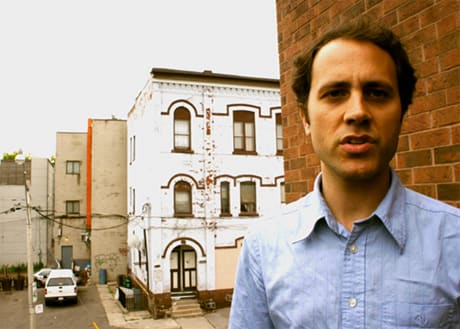Idiosyncratic visionary Sandro Perri strikes the dearest conflation of his eclectic interests with Impossible Spaces, an ambitiously bold statement, sure to stand as one of the finest records of the year. A favourite among musicians in Toronto and beyond, Perri remains something of an outsider. His specialized range requires a variety of monikers (i.e., Polmo Polpo, Glissandro 70) to distinguish his fascination with glitch-y electronic experimentation from his love of challenging jazz and instrumental music, and, perhaps most improbably, his penchant for artful folk and blues, derived from the likes of Skip James. As he did on 2007's brilliant Tiny Mirrors, Perri finds a majestic meeting place for disparate sounds, but he's chosen a livelier home for his ideas here. Driven by synths, drums, guitars and various woodwinds and horns, the record is stirring, happily mired in a dreamy temporal confusion that sends "Changes" and "Futureactive Kid (Parts I & II)" off with a pulsing electrical charge. While he's been regarded as stern and sombre in the past, the sonic shift of Impossible Spaces better showcases Perri's gorgeous voice and warm perspective, which float within witty, earnest songs that practically smile through the speakers.
What inspired this idea of "impossible spaces?"
That phrase was the first thing that came out of my mouth when I was writing that song six years ago. I couldn't finish it and sat down with my friend Jordan [Somers] and he came up with the rest of the lyrics. He passed away shortly after so, on that level, it seemed like a fitting title. It can apply to dealing with death, but finding it impossible. There are many spaces in your mind that can feel impossible, but there's still an impetus to reach them even though they're moving away from you.
Do you think people underestimate your playfulness?
It's not a surprise that people would feel that I'm overly serious, especially in the music I've released, because it's true; I've probably coloured things that way for a lot of reasons. It's harder to be playful in music because there can be a misperception that it's superficial. People are afraid of it because it requires balance, perspective and vulnerability. Humour does require vulnerability and sometimes you need to protect yourself by being serious or distant. When you explore it more though, you do become more comfortable with it.
What inspired this idea of "impossible spaces?"
That phrase was the first thing that came out of my mouth when I was writing that song six years ago. I couldn't finish it and sat down with my friend Jordan [Somers] and he came up with the rest of the lyrics. He passed away shortly after so, on that level, it seemed like a fitting title. It can apply to dealing with death, but finding it impossible. There are many spaces in your mind that can feel impossible, but there's still an impetus to reach them even though they're moving away from you.
Do you think people underestimate your playfulness?
It's not a surprise that people would feel that I'm overly serious, especially in the music I've released, because it's true; I've probably coloured things that way for a lot of reasons. It's harder to be playful in music because there can be a misperception that it's superficial. People are afraid of it because it requires balance, perspective and vulnerability. Humour does require vulnerability and sometimes you need to protect yourself by being serious or distant. When you explore it more though, you do become more comfortable with it.




